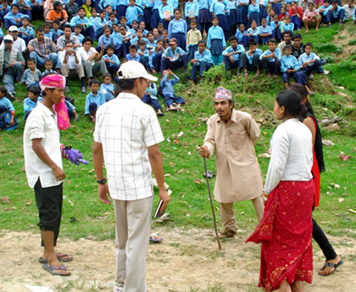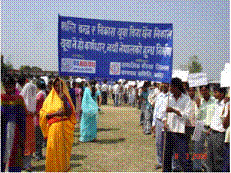Youth in Action: Supporting Peace and Reconciliation
In August 2006, the U.S. Agency for International Development’s Office of Transition Initiatives (OTI) began a program in Nepal to bolster the current peace process, strengthen governance mechanisms, and support positive, nonviolent community engage¬ment in the country’s political, social, and economic future. The objectives of the program are to:
- Increase access to information and diversify public debate on issues critical to political transition, and
- Increase local-level engagement and participation in the peace process.
 |
Artists perform a street drama on peace and reconciliation at the local level. |
Youth participation remains a key element in motivating Nepali communities to support the peace process. At the same time, young people in the Central Terai are under a great deal of pressure to join the ranks of armed groups, political parties, and politically affiliated youth groups. Educating and mobilizing youth for peace-building and conflict resolution activities, however, has proven to be an effective way to reduce youth involvement with agitating groups, foster communal harmony, and mitigate the violence that has become commonplace in some areas.
Recently, USAID/OTI supported local partners with the implementation of five youth-focused activities that trained and mobilized 265 youth peace volunteers in 125 Village Development Committees (village areas or VDCs) and four municipalities in the Central Terai. The volunteers disseminated essential information on peace and reconciliation, community conflict management, good governance, and human rights to more than 20,000 people in the targeted districts. The activities also supported the formation of 63 Youth Listeners Groups and Youth Peace Committees that held regular discussions with young people on issues that affect youth and the ongoing peace process.
 |
A rally in Kalaiya, Bara, encourages youth to work for peace. |
The peace volunteers have already had a positive effect on their communities. They have established themselves as sources for accurate, important information regarding the transition and have been called on to mediate community-level disputes. One youth volunteer said that before the training he could not see how peace could come to Nepal, but after participating in the activities, he realized that peace building starts at the local level. The volunteers have also been writing and placing articles with leading regional newspapers, providing information on peace and reconciliation, good governance, and human rights to an even wider audience.
As youth have had opportunities to participate in civic discussions and to mediate community disputes, a moral voice has emerged among them, one which they want to use for positive change in their communities. And seeing the positive outcomes of these activities, many secretaries of VDCs that were not involved with the original projects have asked OTI’s grantees to initiate similar activities in their village areas.
For further information, please contact:
In Washington, D.C: Brigitte Hoyer, OTI/ANE Program Manager, 202-712-5212, bhoyer@usaid.gov
|


